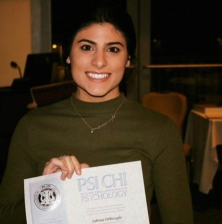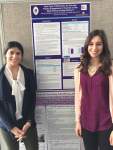Sabrina DiBisceglie is a senior psychology major at The University of Scranton. She was interviewed by junior Madison Montalbano.
UofSHealthPsych: Where are you from, and what drew you to the University of  Scranton?
Scranton?
SD: I am from a small town in Bergen County, New Jersey named River Edge. My guidance counselor in high school suggested I should look at the University of Scranton because it was a smaller school. Once I stepped onto campus I was drawn to the community feeling. As I looked around I saw many students walking in groups, playing frisbee, on the green, and walking with professors. I knew this was the type of atmosphere that I would want to spend my four years in.
UofSHealthPsych: When did you realize health psychology interested you?
SD: In high school I wanted to be a physical therapist or athletic trainer. It wasn’t until I had taken those college ‘what career would be best for you’ tests that my mind changed when It told me I should be a social worker. I knew that was not something I would be interested in, so I turned to psychology since I was drawn to the scientific aspect of the field. Freshman year I went into psychology thinking I was going to pursue sports psychology. I had the opportunity to sit down with Dr. O’Malley and he pointed me towards Dr. Arigo, and he assured me health psychology was really the field that dealt with all my interests. Once I joined the Clinical Health Psychology lab, I knew this was exactly the field of psychology I wanted to be in.
UofSHealthPsych: Can you tell us a little bit about your individual research project for the Clinical Health Psychology Lab?
SD: I am most interested in physical activity and what motivates one to exercise. What I have been fascinated by is the movement of #fitspiration on social media. As college students we are shaping our future habits and behaviors. With social media engagement increasing and becoming a consistent and frequent behavior in our everyday lives, it shapes what kind of content and messages we encounter daily. I think with #fitspiration having a big presence on social media, it may have an effect on behaviors such as exercise engagement. Through my research I am exploring the reasons behind why people post #fitspiration and the perceived outcomes/benefits of viewing such posts may be. I am also interested in understanding the use of #fitspiration as a motivational tool to enhance exercise engagement in both men and women. I had a Presidential Fellowship to stay on campus and work on these projects over the summer, and I’m applying for grant funding to increase the scope of this work.
 UofSHealthPsych: Aside from research, what clubs or activities on campus are you involved in?
UofSHealthPsych: Aside from research, what clubs or activities on campus are you involved in?
SD: This year I am an officer for the Psychology Club and Psi Chi (the Psychology Honors Society). I am also President of the University of Scranton chapter of the Association for Psychological Science Student Caucus (APSSC), which is the psychology research club on campus.
UofSHealthPsych: What would you say has been the greatest advantage of being a part of the Clinical Health Psychology Research Team?
SD: This lab has allowed me opportunities and experiences that would not be possible if I were not part of the research team. I have assisted in individual projects for other students, worked on Dr. Arigo’s research, and now have the opportunity to conduct my own research. This lab has also provided me with research skills through hands-on experience. I think learning the skills in class is helpful, but being able to apply and utilize what is learned about conducting research from the beginning of the process to the end is really beneficial.
UofSHealthPsych: What skills have you gained from working as a research assistant will be most useful in the future?
SD: I have learned how to communicate with participants which can help in research as well as clinical settings in the future. I have also learned how to read articles and discuss them analytically. This may seem like a general skill, but I believe being able to pull out the significant parts of an article and to be able to develop informed opinions and discuss the information is important in any scientific based field. Being able to understand what is already out there and to expand upon your knowledge is an important skill for all professionals.
UofSHealthPsych: What are your plans after graduation?
SD: In the upcoming year, I plan to take a gap year in which I will continue to work on my research, as well as apply to graduate schools. I plan on applying to Clinical Health Ph.D programs to continue studying the psychology of physical activity.